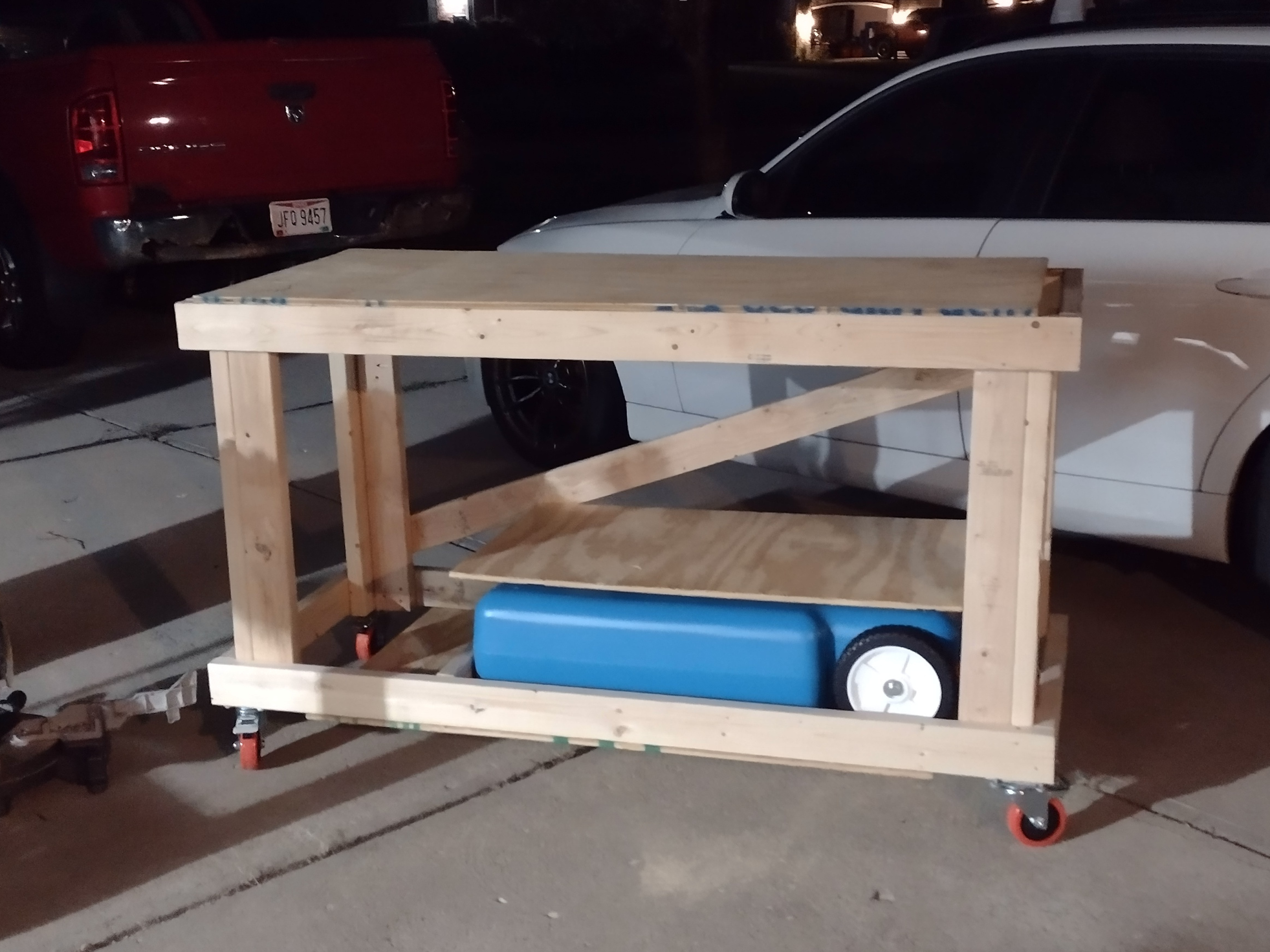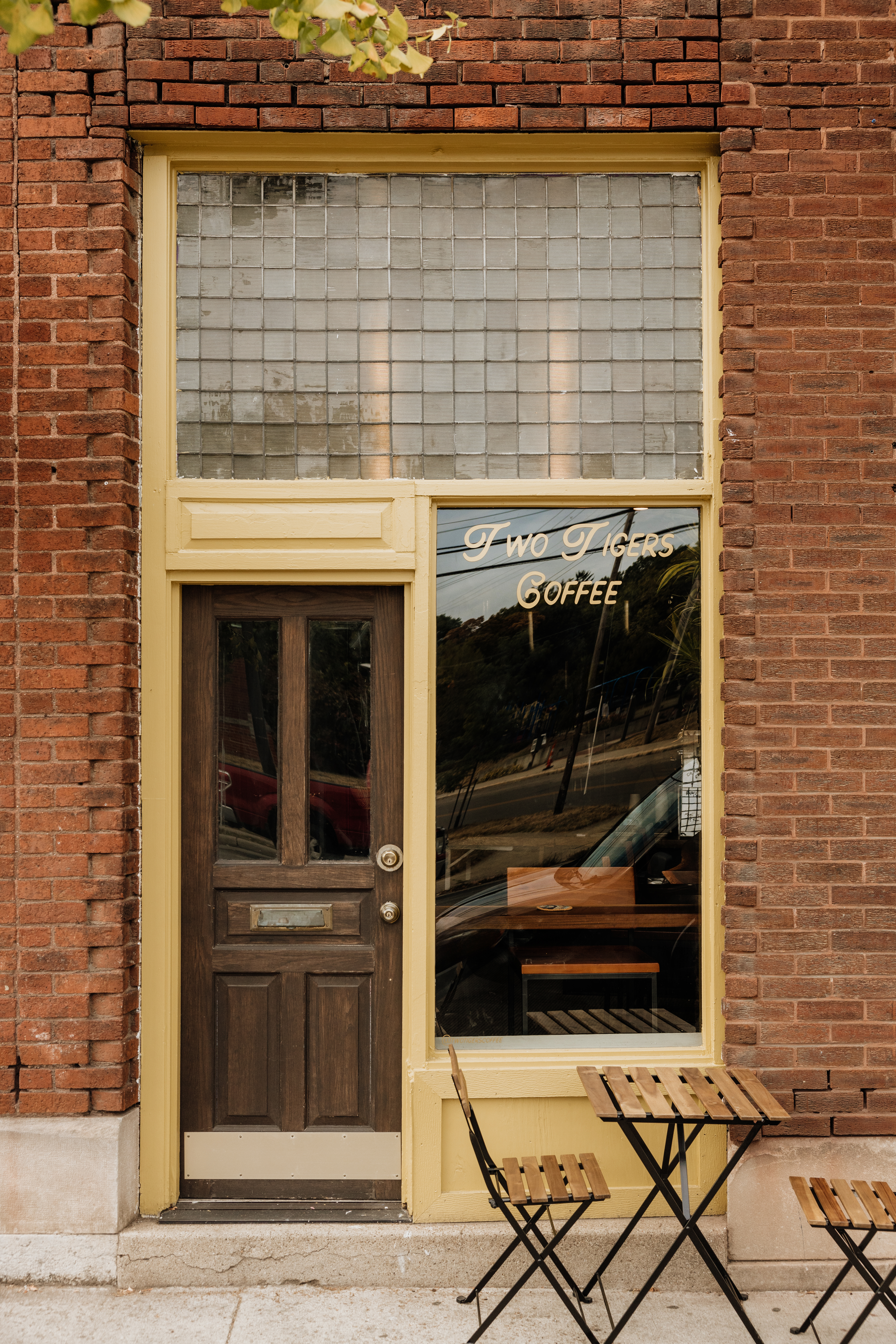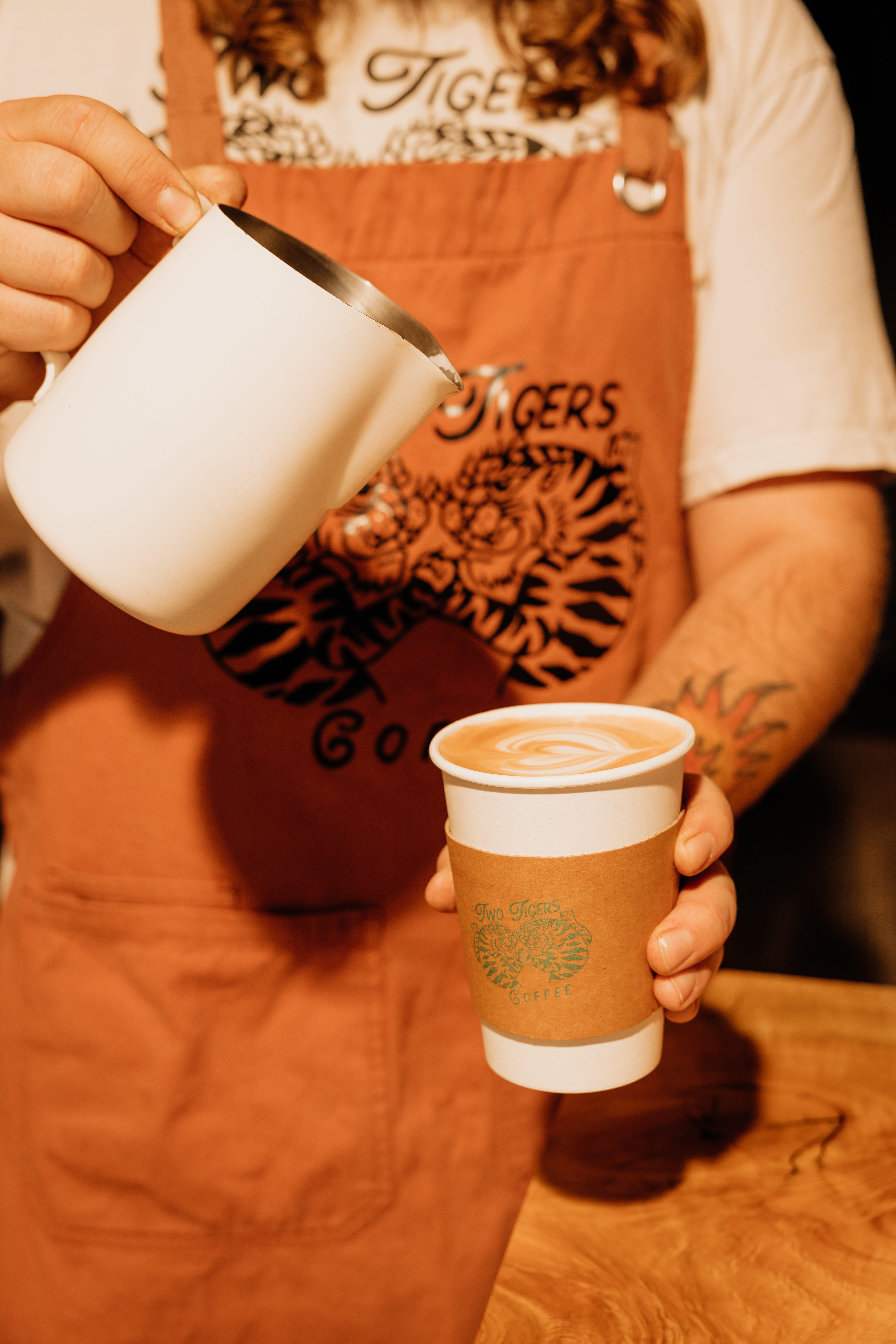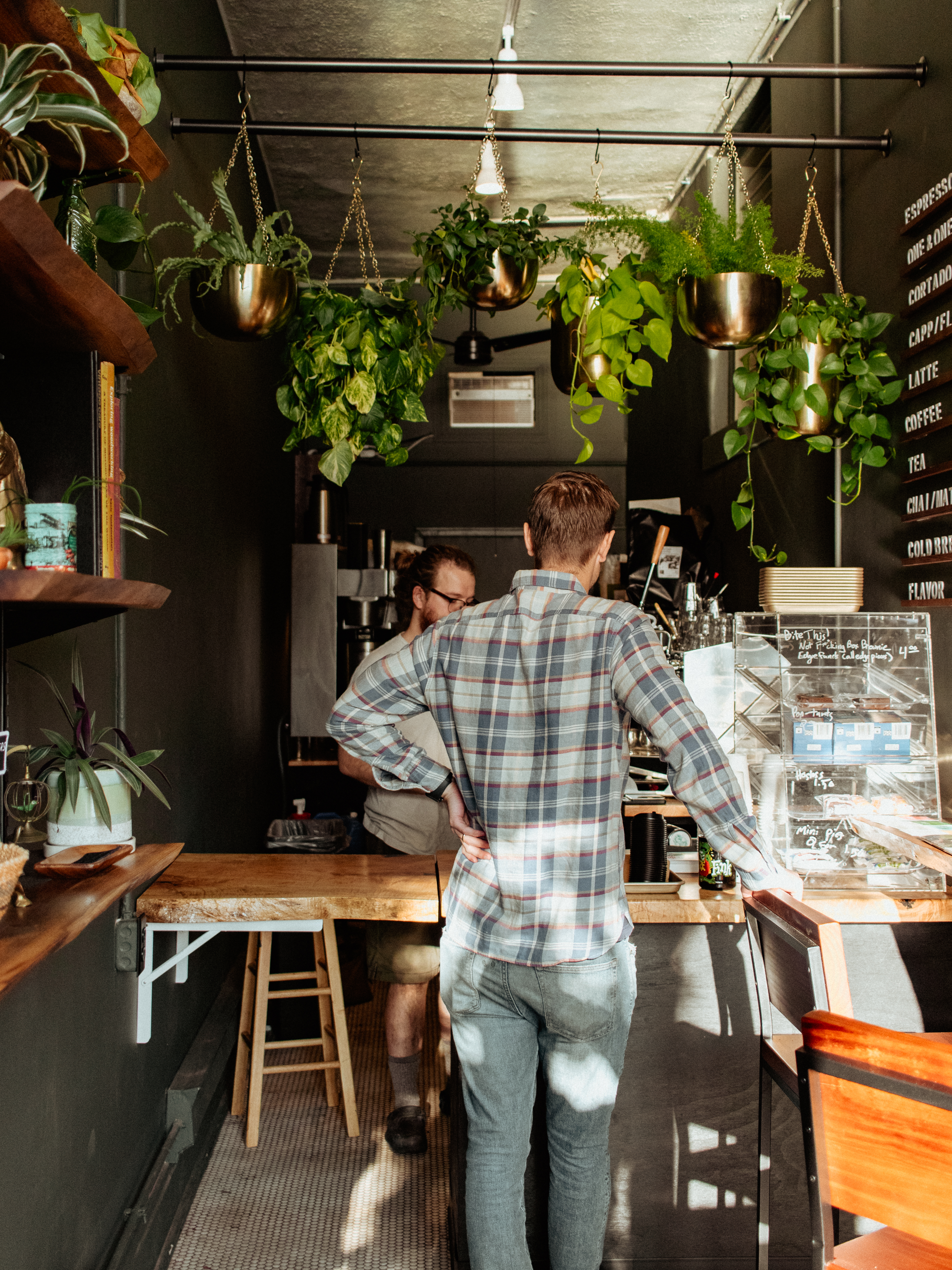Q+A with Tony Hodgson of Two Tigers Coffee
The journey of entrepreneurship in the coffee industry often begins with a deep passion for coffee and a genuine desire to serve others. For many, this path starts with a love for brewing at home and evolves through hands-on experience in coffee shops. For some, it leads to opening a mobile coffee cart, which provides a unique opportunity to enter the coffee business with lower risks and greater flexibility. Operating a cart allows entrepreneurs to connect with diverse communities, adapt to various locations, and gauge customer preferences without the overhead of a traditional café. As they gain experience and build a loyal following, many find that this initial venture can pave the way for exciting expansions, such as opening a brick-and-mortar location and deepening their impact in the coffee world.
Recently, Prima took a bold step to expand our offerings by introducing The Woodress Model 1 Mobile Coffee Cart for purchase—an idea sparked by the creativity and passion of our Prima Coffee Community members. We’re excited to kick off this new chapter by highlighting Tony Hodgson, a dedicated member of the Community, to discuss his mobile coffee journey at Two Tigers Coffee Cart. Tony's journey reflects the challenges and triumphs of starting a mobile coffee business, and ultimately transitioning into a brick and mortar space. From sourcing materials and navigating health regulations to crafting a unique menu that stands out in the competitive coffee landscape. With insights from his recent experiences, Tony shares what it takes to bring quality coffee to the streets and build meaningful connections within the community.
 Photo by Amanda Lauren
Photo by Amanda Lauren
Q: Can you describe the journey that led you to start Two Tigers Coffee Cart? Were there any pivotal moments or experiences that influenced your decision?
A: I started in coffee, like many, as an enthusiast. I loved making pour-overs and started to dabble in espresso after receiving a Breville Barista Express as a wedding gift. I later got a job in a coffee shop, and after 1-2 years there decided I wanted to try having my own venture. For me, starting as a cart was a way to dip my toe into business ownership without having to take on some of the big risks of actually starting a coffee shop. I didn't have to get a loan, there was very little ongoing overhead, and no multi-year commitments to things like a lease. There were also not many, if any, coffee carts in my area at the time, so I felt like I was filling a market need.


Q: How did you source materials and components for building your cart?
A: I had a little bit of woodworking experience, so I decided to make the cart out of wood. All the components of building the cart itself were from local home improvement stores. I got my espresso machine and grinder used, and the water system is a Caffewerks medium volume system.
Q: What were some key design considerations you had to consider when building your cart?
A: I wanted to make my cart big enough to do large events without having to really restock midway through. I also had to fit within my city's regulation size for a push cart, so I needed to have hot water and 4 sinks (a hand sink and a three-compartment sink for washing dishes). Also, I knew I needed a pitcher rinser to keep both service times and water usage down.
 Photo by Amanda Lauren
Photo by Amanda Lauren
Q: What specific challenges did you encounter during the setup of your coffee cart, and how did you overcome them?
A: All of that stuff I listed above is HEAVY. In retrospect, I would've designed a more compact, lightweight cart. After about a year of putting the cart into the back of my pickup truck, I bought a cargo van which has made transport much easier, especially on bad weather days. I also put pneumatic casters on the cart, which has made it much easier to move around grass or gravel lots where I'm often doing events.
Q: Running a mobile coffee business involves logistical considerations. How do you navigate permits, location scouting, and supply chain management, and what have you learned through that process?
A: After I had an idea of how I thought the cart would look, I called my local health department to see if any changes needed to be made. I can't stress enough how important it is to reach out to the health department and local government organizations that you specifically will be licensed through, because only they will be able to tell you specifically what you do and don't need. Regarding locations, I think it's really important to have genuine relationships with other small businesses in your local community. I've always loved going to vintage markets, and pretty soon I was popping up at them. I've made some relationships with event venues and event planners that have gotten me a lot of repeat business, and I've loved getting to develop and maintain those relationships. For supply chain management, I'm honestly probably not the best person to ask - but it's great to have friends in the coffee business who can lend you an extra sleeve of cups and to have a knowledge of what grocery stores stock your favorite milk. I will say that my advice to people looking for roasters is to find someone who you like and would like to be somewhat like, whether your goal is a small, cozy cafe or if you want locations all over the country, and work with them. Many roasters will do training and education on their coffees, too, which helps everyone involved.
Q: What strategies do you use to differentiate Two Tigers Coffee Cart? Can you give examples of unique menu items or customer experiences?
A: When I got started, I was one of the only espresso carts in my area, so being mobile was the big differentiator. I've always been a multi-roaster operation, so local roasters would often send people my way when they needed espresso catering. I know some customers have known me well for some of my interesting and bright signature drinks, like espresso sodas and espresso lemonades.
 Photo by Tyler Jamison
Photo by Tyler Jamison
Q: How did you curate your coffee menu? Do you experiment with seasonal flavors, and how do you decide which new items to introduce?
A: I knew I wanted to keep it simple and manageable. There are a lot of perks to being a cart, but it has its difficulties. 110V espresso machines are not the powerhouses that the bigger 220V machines are. Every flavor you offer has to get packed up and moved around, as well as every coffee and milk option. I only offer whole milk and oat milk. I don't offer matcha at mobile events because it's labor intensive and has several preparation tools involved. I really enjoy simple, well-made drinks, and that's most of what I offer. My biggest drink is 12 oz, so nothing needs more than a double shot of espresso. I do try to have fun with seasonal flavors. It's always nice to drink something that feels crafted for a particular moment in time, people appreciate them, and your individual take on even a popular drink will give some insight into the character of your operation. Mine are always still espresso forward, and I'll often work in something bright like lemonade that people might not normally think to pair with espresso.
Q: What does a typical day look like for you, from opening the cart to serving your last customer? How do you manage your time and resources effectively?
A: For me it usually starts the night before, with loading everything I can into the van: the cart itself, my machines, and anything non-perishable. This helps simplify things in the morning so I'll just have to pick up milk and ice and be on my way. I generally try to arrive at the venue 30-60 minutes before I need to start service, as this is enough time for me to get comfortably set up, especially if I'm familiar with the venue.
 Photo by Tyler Jamison
Photo by Tyler Jamison
Q: Reflecting on your journey since opening in 2022, what has been a defining moment or achievement for you? How did it shape your vision for the business?
A: I think my defining achievement was catering for a large, multi-day conference. Serving coffee for 500 people per day for multiple days was a big challenge, but it gave me a lot of confidence and also helped me to dream a little bigger about what my future could look like and how much I could handle.


Q: What advice would you give to aspiring entrepreneurs looking to start their own mobile coffee business? Are there any common pitfalls they should avoid?
A: I always recommend that people work in coffee before they start their own coffee business. If it's available to you, try to get a job at a cafe, and be upfront with them that you want to eventually start your own business. It's good to have connections with other local business owners, and working behind the bar is a different experience than enjoying coffee in a shop or brewing coffee at home. As far as pitfalls go, I really recommend not trying to grow too quickly. It's easy to get in over your head, especially with recurring expenses.
Q: How did you manage the logistics of running a coffee cart while preparing for your brick-and-mortar launch?
A: In the time I was building out the shop, I really slowed down on the coffee cart events. I'd do private events and the occasional market, but I didn't have any recurring events so that I could focus on making the shop what it needed to be. For me, I use the cart as an integral part of running the shop, so they won't be open separately at the same time.

Q: What inspired you to move from operating a coffee cart to opening a brick-and-mortar location?
A: Honestly, I was just looking for a place to set up the cart more regularly. For me, it wasn't as much a desire to have my own space as it was to be serving more regularly and to form relationships with regulars in a way that wouldn't require them to chase me around the city every weekend. I took a lot of inspiration from @weakcoffeeco in Nashville. Ultimately, in my search for a spot to pop up, my brick-and-mortar location came available. Since the space is so tiny, the overhead was manageable. Additionally, it's in a great location. It provided the consistency I was looking for at a price I could afford, so it made sense to go ahead and proceed with the location.
Q: What were some of the biggest challenges you faced during the transition from a cart to a full-scale shop?
A: Getting used to the new space and overall increased volume were some of the biggest challenges. Where to place cups, syrups, airpots, and other things is always a question in a new space, and I've moved equipment around plenty in the first month or so of operation. I also went to a two-group machine and bought a new grinder when I moved, so there's always some amount of getting used to workflow with new equipment. Picking up groceries, ice, distilled water, etc. once a week for an event wasn't a huge deal when I was only doing pop-up events, but it ended up being a lot more work doing it every day. Getting things delivered pretty much became a must.

Q: What changes did you make to your menu when transitioning from the cart to the shop?
A: I added a few things that I had always wanted to have, but weren't practical in a mobile setup. I now have decaf available all the time, as well as multiple single origin espresso options, pour-overs, and matcha. I also kept in mind what I'd need to make things easier on me as a barista. I offer batch brew and have my pour-overs automated to speed up line times.

 Photos by Tyler
Jamison
Photos by Tyler
Jamison
Q: What advice would you give to other entrepreneurs considering making a similar transition from a mobile setup to a permanent location?
A: Location is really important. With a physical location, you're dealing with most of the things you're dealing with as a mobile cart, but you're locked into that location, and therefore the rent, for usually a few years. Talk to everyone you can—your prospective neighbors, fellow business owners, and your friends and family can all help you gain perspective on whether you're making a decision that's right for you and your business.
We welcome you to join the Prima Coffee Community and join the conversation! You'll unlock access to exclusive content and chats, amazing deals, and join a fun and education community of people who are ready to geek out about coffee! As always, from the Prima family to yours, Happy Brewing!



